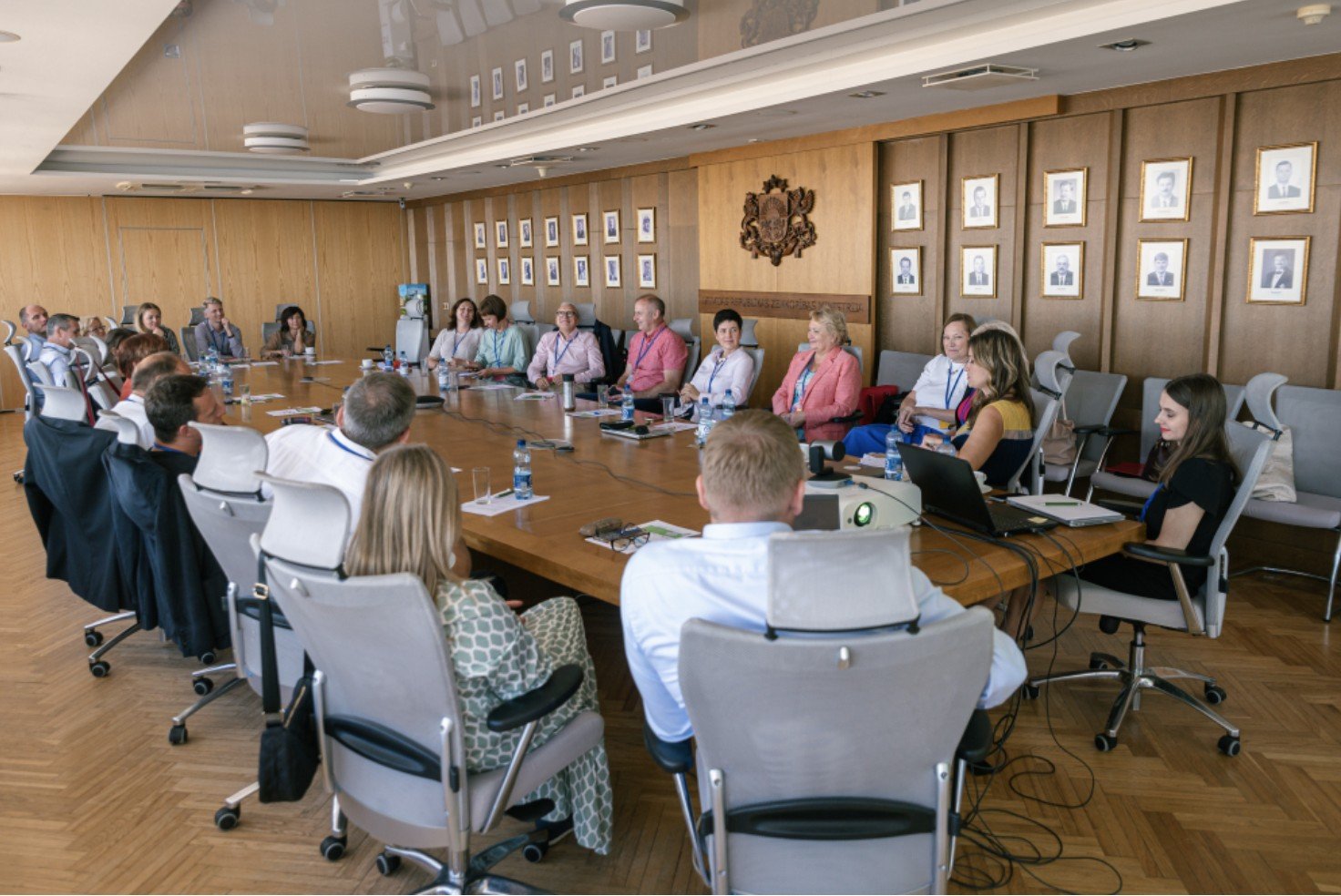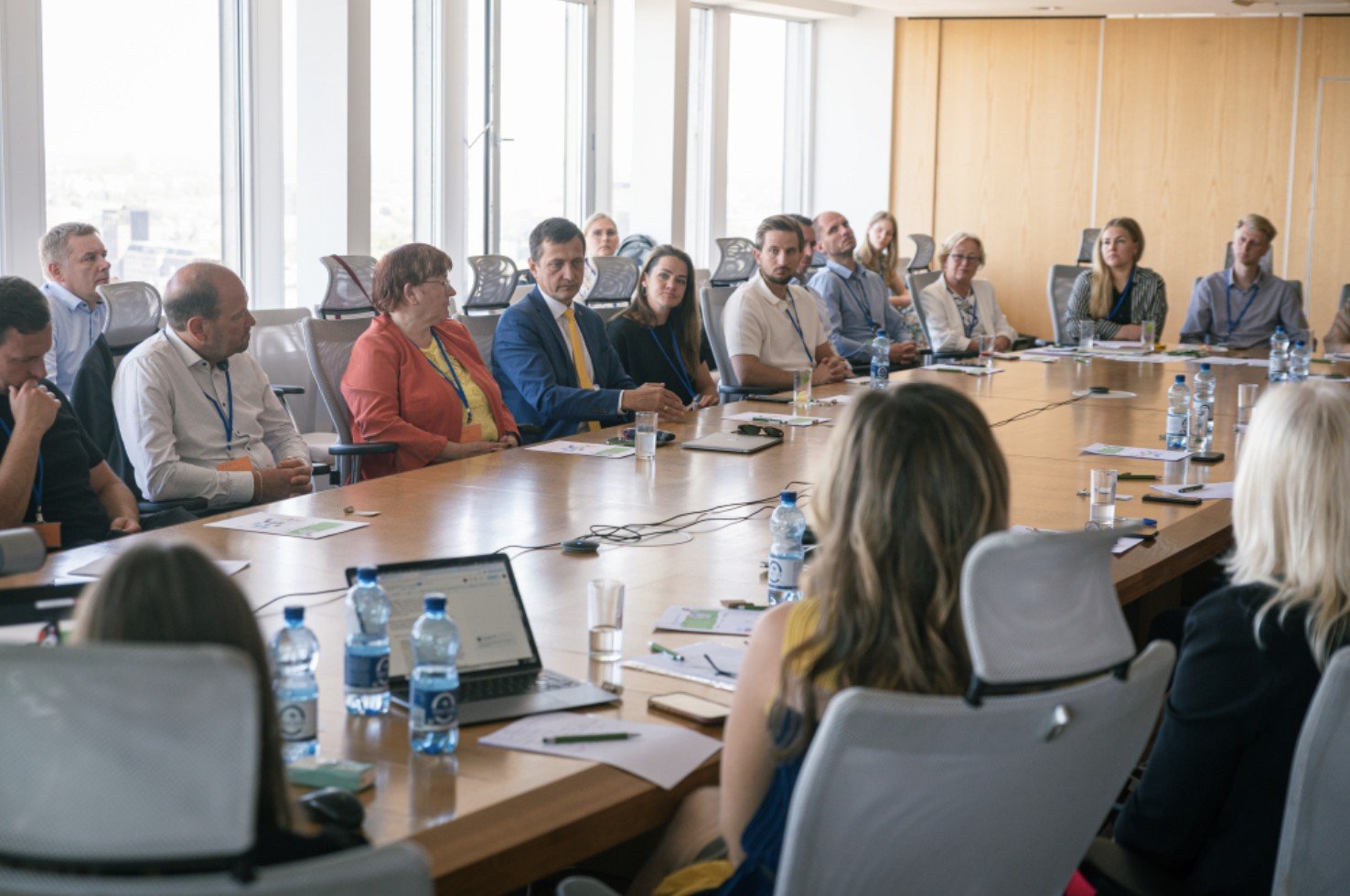A workshop event was held on sustainable food packaging solutions in Latvia
On June 26, a workshop event on sustainable food packaging and value chain roadmap in Latvia was held at the Ministry of Agriculture (ZM), organized by the Latvian Federation of Food Companies (LPUF) within the Value4Pack project, EIT Food representative office in Latvia and the Ministry of Agriculture. In the event leading experts and industry representatives gathered in one place to address one of the most important issues in the food industry – the challenges of sustainable food packaging and possible solutions, which have significantly changed in connection with upcoming changes in packaging and its management legislation in the European Union, and therefore also in Latvia.
Every year, a large number of products are consumed in Latvia, and the amount of packaging that ends up in waste after its use increases proportionally. Research data from the Latvia University of Life Sciences and Technologies (LBTU) show that approximately 35% of products available at retail outlets are packaged in non-recyclable or difficult-to-recyclable packaging. The EU is actively discussing how to reduce the volume of used packaging and at the same time promote the choice of sustainable packaging solutions.
Opening the event, the newly elected rector of the LBTU, Irina Arkhipova, emphasized the relevance of this issue in connection with improving the synergy of ecosystem participants in the context of sustainable packaging: "The circle of the organizers of the discussion and its participants already shows the interest to cooperate together in solving the current problems of sustainable food packaging."
The Minister of Agriculture, Armands Krauze, expressed his satisfaction that this type of events are being organised: "It is very important for producers, consumers, and the country as a whole, because only through such mutual discussions can we comprehensively analyse the current situation, as well as find sustainable solutions considering the interests of various parties. This issue should be looked at in a complex way, from a macroeconomic point of view, when making any changes, we should remember the competitiveness of producers and traders, export opportunities and the interests of consumers."
Sandra Muižniece - Brasava, chairman of the board of the Latvian Packaging Association, professor of LBTU, emphasized: "When analysing the possibilities of reducing packaging, significant attention should be paid to the optimization of conventional packaging and its compatibility with food quality assurance, as well as potential biodegradable (environmentally friendly) for the safety of packaging components and the complete decomposition process. Most biodegradable packaging materials only break down at 60 ℃, everyday consumers cannot provide needed circumstances. Also, often innovative packaging, for example, are made from palm leaves, which are often not environmentally friendly. Therefore, alternative direction of packaging should be considered with as much attention as the plastic itself, in order not to encourage the small micro particles to remain in the environment."
The purpose of the event was to identify and develop concrete measures to improve the synergy of the ecosystem, promote the development of sustainable packaging in Latvia and find concrete ideas to work on as a next step of the event. This goal includes identifying challenges and finding solutions, educating and engaging stakeholders, and fostering collaboration among all members of the ecosystem.
The main conclusions, recommendations and next steps towards sustainability expressed during the event:
• Support for start-ups: Support programs for start-ups should be continued, promoting the creation of sustainable, innovative and safe packaging in a start-up environment. Available opportunities at the moment: Latvian Investment and Development Agency (LIAA) Start-up support programs, EIT Food Entrepreneurship or Value4Pack project activities.
• Building a community involving different ecosystem actors: creating a community to generate sustainable packaging ideas, attract researchers, institutes, companies, commercialize inventions. For example, using the EIT Food platform and networking.
• Short-term and long-term goals: in the short term – to reduce even one gram of non-recyclable materials in today's packaging. Start with an audit to first reduce the amount of packaging where it does not affect the shelf life of the products, nor does it require changing equipment, as it can be done with relatively few resources. In the long term – investments / investment in packaging equipment and technology change.
• Plastic reduction: reduce the diversity of plastic (currently around 200+ types of plastic) and focus on plastic recycling rather than colour and shape.
• In order to reduce the use of plastic and leave a positive impact on the environment, an environmental impact assessment should be carried out for the activities of the participants in the food packaging chain, because often the positive activities are not so sustainable. For example, washing plastic packaging with detergent and water consumes a large amount of water, which is an additional resource consumption and cost.
• Educational initiatives: educating product manufacturers and students (future food and beverage manufacturers) on the selection and optimization of packaging materials and packaging technologies, as well as recycling options.
• Educational initiatives: regular communication with packaging design students, educating and informing about current packaging in the recycling industry.
• Raising public awareness: changing public thinking through education about packaging, its labelling, sorting and good examples such as reusable containers, deposit and packaging-free products. Cooperation with journalists and influencers.
• Evaluation of materials: when prioritizing the evaluation of new substances in packaging, their overall cycle from creation to disposal should be considered. A digital passport for packaging could reduce green fraud: Digital Product Passport.
• Clear communication: Clearer communication about sorting and labelling on products. A potential solution is the introduction of pictograms on waste bins and eventually on packaging.
• Unified requirements: unified requirements for the labelling of packaging materials in all countries, for example by establishing it with a European Commission regulation.
• Transparent process: a transparent process for implementing the regulation and waste tariffs, involving all stakeholders – regulators, waste managers, politicians, researchers, consumers and traders.
• Research Data: In collaboration between businesses and research/scientific institutes to gain real market insight, obtain data and perform useful, research-based, comprehensive analysis of the situation to be able to find potentially useful solutions.
• Proactive approach: thinking about packaging before producing the product, understanding it as a complex process. The importance of research institutes collaboration with businesses.
• A complex eco-system: food packaging is binding on absolutely everyone in the world, because everyone consumes food. Which means that the problem should be solved not only at the European level, but at the global level. However, due to the unequal development of the countries of the world, it is not so easy to agree on binding and unified cooperation in this context.
The round table discussion was attended by:
• Minister of Agriculture Armands Krauze,
• Deputy Director of the Strategic Analysis Department of the Ministry of Agriculture Jānis Šnaksis,
• Deputy Head of the Food Safety Department of the Ministry of Agriculture Māris Valdovskis,
• Director of the Department of Environmental Protection, Ministry of Environmental Protection and Regional Development (VARAM) Rudīte Vesere,
• Latvian Packaging Associations chairman of the board, rector of LBTU Irina Arkhipova,
• LBTU Institute of Food Professor Sandra Muižniece-Brasava,
• Professor of LBTU Rudīte Vesere,
• Director of the LIAA Business Incubator Department Dace Vanaga,
• Chairman of the LPUF Ināra Šure,
• LPUF expert Anna Rozenfelde,
• Chairman of the board of the Latvian Waste Management Association Jurģis Ugors,
• Executive director of the Latvian Food Traders Association Noris Krūzītis,
• Associate professor Maija Rozenfelde, head of the Graphic Design Department of the Latvian Academy of Arts.
In case of questions, please contact the organizers of the discussion – Ilze Laukaleja - Broka from the LBTU
or Anna Rozenfelde from LPUF



